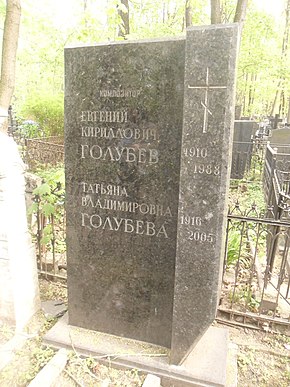Yevgeny Kirillovich Golubev
Evgeny Golubev ( Russian Евгений Кириллович Голубев * 3 . Jul / 16th February 1910 greg. In Moscow ; † 25. December 1988 ) was a Russian composer .
Life
Golubew gained his first musical experience in a church choir. Because of his unusual talent, he became a pupil of the Gnessin Institute at the age of nine , where he first received piano lessons and later also music theory lessons (including polyphony with Heinrich Litinski ). From 1931 he studied composition with Nikolai Mjaskowski at the Moscow Conservatory . He also took private lessons from Sergei Prokofiev in 1935 .
In 1936 he completed his studies with the oratorio "The Solstice" based on Lappish folk texts. Golubew then stayed at the Conservatory and completed an apprenticeship with Myaskovsky in 1938. From 1937 to 1959 he taught polyphony there himself, and from 1938 also composition. In 1947 he received a professorship; from 1956 to 1959 he headed the Faculty of Composition. Golubev played an important role as a teacher; almost all young composers took polyphony lessons from him at that time. A number of well-known composers such as Tatjana Nikolajewa , Andrei Eschpai , Alfred Schnittke and Andrei Golowin sprang from his own composition class .
Golubew was involved in the Moscow Composers 'Union and from 1962 to 1974 was chairman of the piano department at "Sovetsky Kompositor", the music publisher of the Soviet Composers' Union. In 1961 he was awarded the Order of the Red Labor Banner , and in 1966 he was given the title “People's Artist of the RSFSR ”. Golubew also appeared as a pianist, mainly of his own works. His pupil Tatajana Nikolajewa worked as a pianist for his works.
Audio language
Golubev's musical language is deeply rooted in Russian tradition. In particular, the influence of his teacher Mjaskowski can be proven in many works; especially in terms of harmony, melody and rhythm. Golubev's compositional stance also resembles that of Mjaskowski: starting from traditional models and shapes, he developed a rather conservative, academically based style of music that focuses on seriousness and the compositional craft. Other composers to whom Golubew referred were, for example, Nikolai Medtner , Anatoli Alexandrow or Samuil Feinberg .
Another, albeit less noticeable, influence in Golubew's work is the music of French impressionism , especially Maurice Ravel . This line can be traced to some extent in Golubew's harmony, but it is also noticeable in the timbre of some piano pieces and especially in chamber music with the harp. In a similar way there is also a connection point to the work of Alexander Scriabin .
Golubew's work is stylistically quite consistent in itself, only a slight modernization in the sense of a more advanced harmony and freer treatment of tonality can be seen in later works. In the Soviet music scene Golubev held a special position; as one of the few composers he continued the Myaskovsky tradition (comparable at most to Vissarion Schebalin ). The influences of Shostakovich characteristic of most Soviet composers are as alien to his work as those of his temporary teacher Prokofiev; Golubev cannot be classified into party-affiliated currents (such as Khrennikov's ). Since the end of the Soviet Union, Golubew has been seen primarily in his role as a teacher.
Works
- Orchestral works
- Symphony No. 1 op.11 (1934, rev. 1950)
- Symphony No. 2 op.17 (1938, rev. 1973)
- Symphony No. 3 op.21bis (1942, rev. 1974)
- Symphony No. 4 op.28 (1947)
- Symphony No. 5 in A minor, Op. 45 (1960)
- Symphony No. 6, Op. 51 (1966)
- Symphony No. 7 in B flat minor op. 67 "Heroic" (1972)
- " Odysseus ", ballet op. 50 (1965)
- "The Heroes of October", symphonic poem op. 42 (1957)
- Ukrainian Rhapsody in G minor, Op. 81 (1982)
- Concerts
- Piano Concerto No. 1 in A minor, Op. 24 (1944)
- Piano Concerto No. 2 in D flat major, Op. 30 (1948)
- Piano Concerto No. 3 in G minor, Op. 40 (1954)
- Violin Concerto in D minor, Op. 56 (1970)
- Viola Concerto op.57 (1962)
- Violoncello Concerto in D minor, Op. 41 (1956)
- Vocal music
- "Die Sonnenwende", oratorio based on a Lappish legend op. 12 (1936, rev. 1980)
- "Immortal Heroes", oratorio op. 25 (1946)
- "The Death of the Poet", poem for baritone and orchestra op. 43 (1957)
- Six choirs based on old Russian liturgical texts, Op. 88 (1986)
- Songs
- Choirs
- Chamber music
- 24 string quartets (1931–86)
- Piano quintet op.20 (1938)
- Quintet for Harp and String Quartet in C minor op.39 (1953)
- Quartet for two flutes and two harps op.49 (1963)
- Violin Sonata op.37 (1952)
- Violoncello Sonata op. 60 (1972)
- Trumpet Sonata in E flat major op. 36/1 (1951)
- Piano music
- 10 sonatas (1930-77)
- "Ukrainian Rhapsody" op. 14 (1936)
- Triptych for piano or organ op.85 (1985)
- smaller pieces
Web links
- Catalog of works ( Memento from November 15, 2013 in the Internet Archive )
- smaller factory meetings
- some piano pieces as MIDI files
swell
- Igor Karpinsky: Golubev, Evgenij Kirillovič. In: Ludwig Finscher (Hrsg.): The music in past and present . Second edition, personal section, volume 7 (Franco - Gretry). Bärenreiter / Metzler, Kassel et al. 2002, ISBN 3-7618-1117-9 ( online edition , subscription required for full access)
- Hollfelder, Peter: The Piano Music , Hamburg 1999
- Tjulin, Juri : Supplement to CD MELODIJA MEL CD 10 00925: Yevgeny Golubew: Piano Concerto No. 3, Piano Sonata No. 4
| personal data | |
|---|---|
| SURNAME | Golubev, Yevgeny Kirillovich |
| ALTERNATIVE NAMES | Голубев, Евгений Кириллович (Russian); Golubev, Evgeniĭ Kirillovich |
| BRIEF DESCRIPTION | Russian composer |
| DATE OF BIRTH | February 16, 1910 |
| PLACE OF BIRTH | Moscow |
| DATE OF DEATH | December 25, 1988 |
| Place of death | Moscow |
